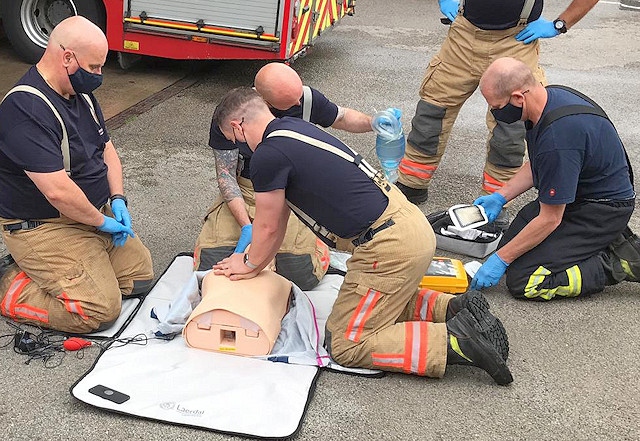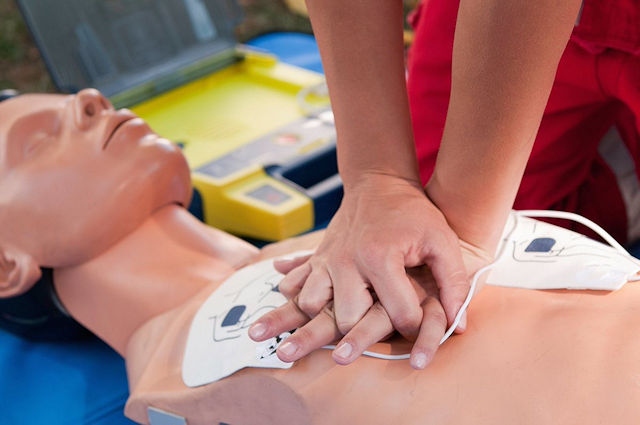Public urged to refresh CPR skills
Date published: 17 June 2021

GMFRS firefighters practised CPR during a routine training exercise on Monday 14 June
Scroll down for Video
Greater Manchester Fire and Rescue Service (GMFRS) is encouraging the public to learn about CPR and refresh their First Aid skills, with the city-region’s firefighters doing the same.
The announcement follows international footballer Christian Eriksen’s cardiac arrest during Denmark's Euro 2020 game against Finland on Saturday (12 June), where the player received emergency medical treatment on the pitch before being taken to hospital.
Thankfully, the 29-year-old is currently stable and has sent a message to his team-mates.
Now, GMFRS is encouraging all residents of Greater Manchester to develop their own knowledge of First Aid because one day anyone could help save another person’s life.
Dave Russel, Chief Fire Officer at GMFRS, said: “I’m a Blackburn Rovers season ticket holder and like so many football fans was shocked and upset by Christian Eriksen falling ill during the game. As an emergency service our thoughts are with him, his family, and friends as he begins his recovery.
“The incident provided a timely reminder that the human body is a fragile thing and that we can all help ourselves and our fellow residents by learning about First Aid and how we can help in a medical emergency.
“GMFRS works closely with North West Ambulance Service and we are always hugely impressed by their colleagues’ skills and expertise, but you don’t need to be a medical expert to help save a life.
“Learn First Aid, develop CPR skills, because you never know when it might be needed.”
A cardiac arrest is an extreme medical emergency and happens when the heart stops beating in a normal way, preventing blood from pumping around the body. Knowing how to help could save a life.
Someone in cardiac arrest will die within minutes unless treated immediately with CPR. A person can perform CPR whilst waiting for the ambulance to arrive.

If you come across someone in cardiac arrest, the public are encouraged to think ‘DRS ABC’:
- Danger – keep calm and check the scene is safe to approach
- Response – shout ‘are you OK?’ and shake the person’s shoulders
- Shout for help – send someone for help and call 999
- Airway – tilt the head back gently to open the airway
- Breathing – check for normal breathing by looking at the chest to see if it is rising and falling or listening for abnormal sounds such as infrequent and noisy gasps
- Compressions – if the patient is not breathing normally, start hands only CPR pushing hard and fast in the centre of the chest.
If there is a defibrillator nearby send someone to get it. You do not need prior knowledge of how to use one as it will give clear instructions. It could save someone’s life.
You can find your nearest defibrillator here.
If CPR is required, the instructions to follow are:
- Kneel at the side of the patient
- Put the heel of your hand in the centre of the chest with the other hand on top (use one hand for a child and two fingers for a baby)
- Keep your arms straight and elbows locked
- Push down hard and fast – twice per second
- Let the chest come back up before you press down again
North West Ambulance Service (NWAS) also has a helpful advice sheet available online, as well as an instructional video.
NWAS Interim Head of Service for Greater Manchester, Dan Smith, said: “We would encourage everyone to learn CPR and other first-aid skills, as you never know if you might need to provide life-saving treatment to a family member, friend or even a stranger in an emergency.
“In these circumstances, we want everyone in cardiac arrest to have the best chance of survival, no matter when or where they take ill and the sooner effective CPR can start, the greater the increase of survival.”
Learn how to recognise a cardiac arrest, what to do when someone is in cardiac arrest, how to perform effective CPR, and how to use a defibrillator.
©North West Ambulance Service (NWAS)
Do you have a story for us?
Let us know by emailing news@rochdaleonline.co.uk
All contact will be treated in confidence.
Most Viewed News Stories
- 1Royton haulage firm fined after Rochdale dad went to work and didn’t come home
- 2Rochdale church to host Camerados public living room
- 3Unique colour and sound experience comes to Rochdale in May
- 4Suspended council candidate was ‘politically naive’ for appearing in George Galloway video, leader...
- 5Community support needed for funding bid to repair viaduct on East Lancashire Railway route
To contact the Rochdale Online news desk, email news@rochdaleonline.co.uk or visit our news submission page.
To get the latest news on your desktop or mobile, follow Rochdale Online on Twitter and Facebook.


